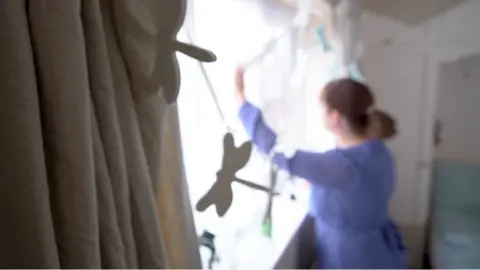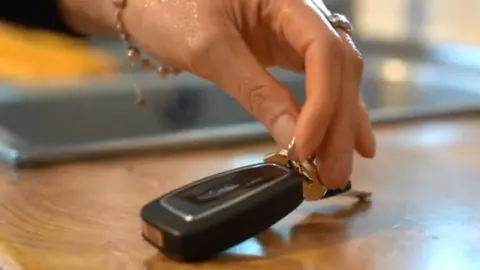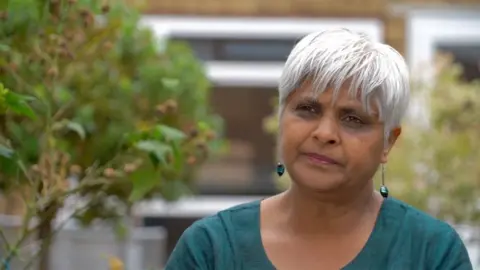Coronavirus: Domestic abuse helpline sees lockdown surge
 BBC
BBCMore than 40,000 calls and contacts were made to the National Domestic Abuse Helpline during the first three months of lockdown, most by women seeking help, new figures show.
In June, calls and contacts were nearly 80% higher than usual, says the charity Refuge, which runs the helpline.
And as restrictions ease, there is a surge in women seeking refuge places to escape their abusers, the charity says.
The government says it prioritised help for domestic-abuse victims in lockdown.
'Vile crime'
In a statement, the Home Office said it had recognised early on the risks of a nationwide lockdown for victims of domestic abuse and focused on ensuring vital support services remained available.
"From our ground-breaking legislation in the Domestic Abuse Bill, to additional financial support and regular engagement with charities throughout the coronavirus pandemic, the government remains resolute in combating this vile crime," said the Minister for Safeguarding, Victoria Atkins.
As well as a near doubling in the number of women contacting the helpline, Refuge says, the figures also show more needing to flee their abusers.
"We've seen in the last couple of weeks an increase of 54% of women wanting to access emergency accommodation," spokeswoman, Lisa King said.
'Started drinking'
Tanya was among those who fled her abusive husband during the lockdown.
"When we were on lockdown, things became much worse," she says.
"Before, he was drinking only in the early hours of the evening.
"Then, when Covid happened, he started drinking in the early hours of the morning.

"And he started getting very aggressive.
"When he was hitting me, mentally it was affecting me more.
"He pulled my hair.
"He threw me against a wall.
"I thought, 'That's it.'
"'I need to end this.'"
Feels powerless
Meanwhile, Claire, separated from her ex-partner, continues to receive support from Refuge, as the lockdown has meant fresh emotional abuse in that he has breached custody arrangements - at one point, refusing to hand back their young daughter.
With no court hearing in sight, because of the pandemic, Claire says she feels powerless.
"It's like I am in lockdown with him," she says.
"It's difficult to feel like I'm handing over my daughter, knowing that potentially I might not get her back."
Too frightened
As well as calling Refuge, women have sought help online.
During the lockdown the charity set up a live chat service, allowing women too frightened to make a call to tap in and describe in message form what they were going through.

"We've been able to talk to women even when their perpetrators are at home with them," one support worker said.
"It can be easier to grab 10 minutes in the bathroom on your phone, doing something that is silent."
Extra funding
The helpline deals with complaints from women only.
Men reporting abuse are directed to other specialist services.
The Men's Advice Line says it received nearly 8,500 calls over the first three months of the lockdown, significantly higher than during the same period last year.
During the lockdown, the government announced about £30m in extra funding.
But Refuge and other charities say as restrictions ease, a longer-term funding strategy is needed.
Migrant women
The lockdown proved particularly difficult for migrant women, who are frequently not entitled to financial help from the state, according to the charity Southall Black Sisters.
"As we come out of the lockdown, we are afraid that we are going to see a surge in demand, particularly migrant women with no recourse to public funds," director Pragna Patel says.
"They would have been the ones feeling most entrapped in situations of abuse because they would have thought, 'There's nowhere for me to go.
"'I have no money.'"
State help
Tanya found herself in exactly this position when she left her husband with £4 in her pocket before going to Southall Black Sisters for help.
"If I had stayed in that house, I don't know whether I would be here today," she says.
"I was in a situation where I wanted to finish my life completely.
Ms Patel said the Domestic Abuse Bill, currently going through Parliament, had failed to address the plight of women such as Tanya, unable to access state help.

Immediate danger
"Women have put up with really coercive controlling environments, particularly Asian women who live in households with multiple members of a family, which can often translate into multiple perpetrators of abuse," she said.
"We had a case just two weeks ago of a woman who took her own life because she felt that was the only way out of the abuse."
The Home Office said it had committed £1.5m "to pilot work later this year to better understand needs in this area".
It urged anyone in immediate danger and fearing for their life to contact the police.

For information and support on domestic abuse, contact:
- Police: 999 press 55 when prompted if you can't speak
- Refuge UK-wide 24-hour helpline: 0808 2000 247
- Welsh Women's Aid Live Fear Free 24-hour helpline: 0808 80 10 800
- Scotland National Domestic Abuse and Forced Marriages 24-hour helpline: 0800 027 1234
- Northern Ireland Domestic Abuse 24-hour helpline: 0808 802 1414
- Men's Advice Line 0808 801 0327
Online webchats and text services are also available.
